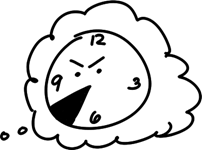Not about not wasting time
| productivityA fact-checker from FLARE Magazine followed up on a recent interview I did on time-tracking and sleep, which will come out in the September issue. Among other things, he asked me to confirm the following statement: "You mentioned that after a few weeks or months analyzing sleep date and daily schedules, most can find more otherwise wasted time for sleep." It turns out I have a strong reaction against this idea of “wasting time”, so we explored the nuances in a phone call. I thought I’d dig into those ideas here so that I can understand them further.
People often ask me about tracking time. They say things like: “I waste a lot of time commuting/waiting/doing chores/watching television.” “I want to spend more time writing, but work and family obligations get in the way.” “I should be exercising, but I find myself playing video games instead.”
I try to share not only the mechanics but also a good mindset. Like everything that you can track, you can lose yourself in self-criticism or frustration. Beating yourself up may work for some people, but I find that it’s easier to learn and grow if I accept where I’m coming from. Practise loving kindness, even with—especially with—yourself.
You choose your activities because you’re getting some kind of payoff from it. Maybe you don’t consciously decide, and maybe you haven’t questioned your assumptions, but you always get something – whether it’s the opportunity for progress or the avoidance of pain. You might take a chance that doesn’t work out, but that doesn’t mean your decision was bad. It’s okay. Embrace that, and work on understanding your decisions and trade-offs.
I gave this example: Work is valuable. But if you work long hours and deprive themselves of sleep, it can affect your ability to do things at work and outside work. If you’re okay with the trade-offs, then it’s fine – maybe a temporary sacrifice to make things better. If you aren’t okay, it might be a good opportunity to examine your assumptions. Is more really better?
So that’s one reason why you aren’t wasting your time: you’re probably getting something out of it, although you might not have thought about what that is and what you’re giving up. If you try to cut out all television-viewing for your life so that you can free up time for reading, but you don’t address the underlying needs or tensions that were why you chose TV over other activities before, you’ll be fighting yourself. The Power of Habit has a good explanation of the habit loop and how to replace habitual actions with others.
My life is full of things that people might consider wastes of time. I sleep when I’m sleepy. I write my way through tangled thoughts. I read things that may not be immediately helpful. But it’s all part of my life. Sometimes I consciously decide how to spend my time. Sometimes I do things without looking at the trade-offs well. Sometimes I take chances that don’t work out. Still, it feels better to work with what I have than to judge myself for what I don’t.
So instead of “don’t waste time”, I think the goal of my tracking is more about “understand myself better and make better decisions”. Hope that helps clarify the difference!
Do you think you waste time? What do you get out of it?

